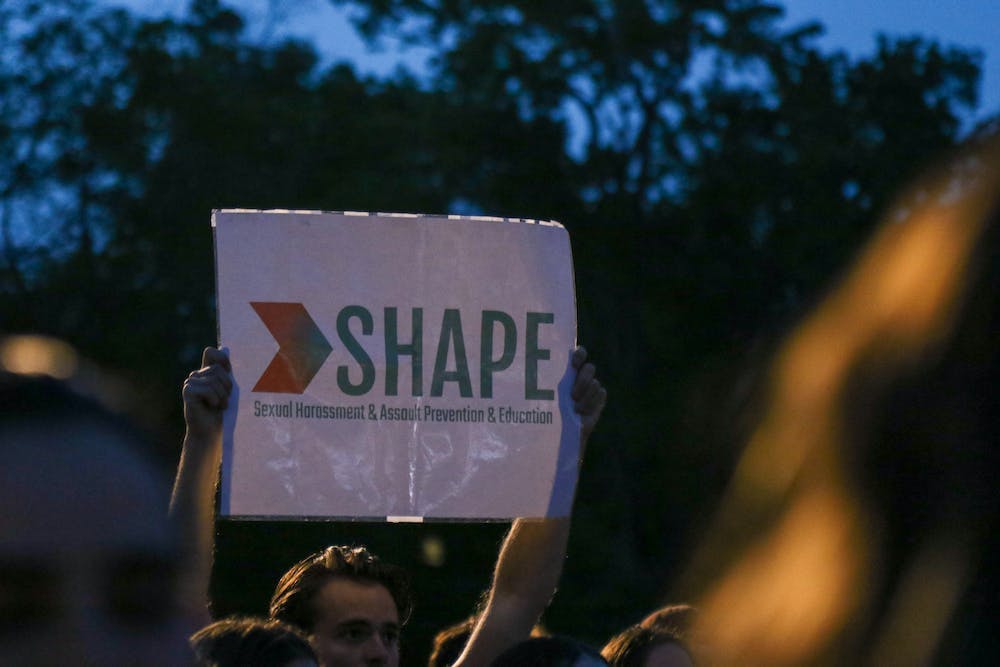This spring marks five years since the founding of Duke Sexual Harassment & Assault Prevention & Education (SHAPE), a student-run organization with the mission of eradicating sexual violence on campus.
SHAPE was established in its first form in fall 2019, stemming from an initiative by then-Duke Student Government senators Jacob Jeffries, Trinity ‘22 and Eden Schumer, Trinity ‘22 with the intent to “raise awareness about sexual assault and harassment on campus.” Since then, it has grown into an independent student organization with 150 members, becoming one of the most prevalent voices for sexual violence prevention and education on campus.
“From my limited experience, I think that Duke has one of the best, most mature discussions of sexual misconduct on campuses in general,” said Co-director Jack Regan, a sophomore. “I think that's in large part because of what SHAPE is and how present it is on campus and how … students just kind of welcomed it into their experience.”
In honor of its fifth anniversary, The Chronicle spoke with SHAPE leaders about the history of the organization and new initiatives that the group is working on.
What does SHAPE do?
SHAPE is divided into four subgroups — policy, Greek life, marketing and outreach.
The organization is most well known for its yearly training sessions to educate members of the Durham Interfraternity Council and Durham Panhellenic Council — both disaffiliated from the University — on sexual assault prevention, safe party practices and fostering a culture of consent and accountability. These trainings reach over 1,300 students per year, according to Co-director Kavya Jain, a senior.
The training sessions, coordinated by senior Talia Granick, co-director of SHAPE’s Greek life team, include three rounds.
The first is an introductory training given to students planning to join Greek organizations. It outlines consent, safe drinking practices, potential risks at parties and campus resources — but also something deeper. The training addresses “entitlement and why sexual assault is such a pervasive problem in Greek life,” Granick said. Regan added that these training sessions are “a first attempt at introducing this kind of discussion to freshmen.”
For new Greek life chapter members, SHAPE hosts a “sober sister” and “sober brother” training. Here they learn “party protocol,” which includes how to safely serve alcohol, how to help someone who may be overdosing and how to intervene in potentially unsafe situations. All chapters of Durham IFC and Panhel have agreed to have SHAPE-trained sober members present at social events.
Finally, there are individual chapter trainings — more discussion-based sessions which Regan hopes will help “direct a culture change” at Duke. Conversation topics include “How do you tell someone you’re interested in sex?” and “What does it mean to be a man?”
“A lot of our forward-facing work is Greek life, and a lot of students hear about us through Greek life … but outreach to other students, I think, is equally as important,” Jain said.
She emphasized that a large goal of SHAPE’s outreach team is to support first-years during the “red zone” — the first few months of college in which people are most likely to experience sexual assault on campus.
SHAPE’s outreach and marketing committees are also heavily involved with SHAPE week, which is held annually during Sexual Assault Awareness Month in April. The week includes tabling and other events and culminates in the Take Back the Night Walk to support survivors and raise awareness for sexual assault prevention efforts in the broader Duke community. This year’s walk will be the third consecutive one and will take place Sunday.
SHAPE’s outreach team also conducts trainings for other student organizations on campus, including cultural identity groups and athletic teams. They have also worked with resident coordinators and quads to plan informative events.
SHAPE over the years
Jain, Regan and Granick all pointed to Duke’s 2018 student experience survey, where 48% of female undergraduate respondents reported that they had been sexually assaulted since arriving at Duke, as a catalyst for the creation of SHAPE.
The organization got its name from the hashtag #SHAPEUpDuke, which came out of the “backlash” to how “bad” things had gotten on campus and a realization that “we need to do something about it,” Regan said.
Under Jeffries and Schumer, the first SHAPE week was hosted in the spring of 2020 in collaboration with over 20 other student groups on campus. The week concluded with a keynote speech by Nadia Murad, human rights activist and winner of the 2018 Nobel Peace Prize.
“I think that we are able to sit here and talk about all these accomplishments because of the work [the founding SHAPE members] did,” Regan said. “It wasn't like we became a student group and then [administration] started taking us seriously. It was years of really difficult conversations.”
Get The Chronicle straight to your inbox
Sign up for our weekly newsletter. Cancel at any time.
Granick and Jain also pointed to the lack of an accessible campus-wide gender violence prevention organization as a driving force behind the creation of SHAPE. At the time, the Duke Sexual Assault Prevention Team (SAPT) was working primarily with Greek life to implement safe party practices and promote sober brother and sober sister programs.
“A lot of people that aren’t in Greek life still go to Greek life parties,” Granick said. “The issue impacts all students that are involved in all different places.”
SAPT and SHAPE joined forces in 2023 to streamline communication and combine efforts, a move Granick described as a “big accomplishment.” She pointed to the fact that every Durham IFC and Panhel organization has a representative member in SHAPE as a similar advancement.
The same year, SHAPE leaders voiced concerns they felt had not been met by the University during a Reclaim the Night walk. They published a fuller list of demands as a guest column in The Chronicle several days later.
The main demands included an updated student experience survey, clearer communication from administration about policies and resources related to sexual violence, reformed orientation week programming, continued sexual assault prevention education for students and a physical space on campus for the then-Center for Gender Violence Prevention and Intervention, which has since been replaced by the Center for Gender Violence Education and Outreach (GVEO).
Jain attested that University administration had met many of those demands by the following year, adding that SHAPE’s “relationship with administration really has changed” over time and that they work together “so much more.”
SHAPE has been a student-led organization since its founding, which Regan and Jain believe makes it more approachable to other students.
Even as SHAPE leaders emphasized the importance of their independence from Duke’s administration, Regan, Jain and Granick all pointed to increased collaboration with administrators as progress for SHAPE, since Duke employs professionals who, according to Granick, know how to address substance use and gender violence questions “a lot better” than Duke students might.
This year, both DuWell and GVEO became more involved in the development of SHAPE’s Greek life training presentations. Regan added that SHAPE worked closely with administration to develop this year’s sober brother and sober sister trainings, which were conducted for the first time by University professionals through Duke’s social host training program.
To Regan, this collaboration is “encouraging,” representing “a switch as of late with administration being a little bit more willing to compromise.” Granick also credited the work of administrators in Student Affairs who have been pushing for on-campus social events.
Additionally, Jain and Regan have been able to provide student perspectives in administrative decisions, including input on restructuring the presentation of Duke Counseling & Psychological Services resources, communicating policy changes to students and developing the new Sexual Misconduct Climate Survey — the first measurement of student experiences with sexual assault since the initial 2018 survey.
What’s next for SHAPE?
As SHAPE celebrates its fifth anniversary and looks to the future, Jain believes the organization is honing its focus on the cultural root causes of sexual violence.
“We want to normalize having really difficult discussions that make you uncomfortable, that make you understand people's perspectives more,” Regan said in agreement. “You talk to anyone, that is the way to change culture. That is the way to lower statistics.”
Regan added that his main goal for SHAPE going forward is to maintain a strong presence on campus, mentioning his desire for a permanent physical space for the organization. Jain agreed with Regan that conversation and asking tough questions about culture is the way to effect change in systems of justice and better support survivors.
“How can we, instead of villainizing people, actually try to create change?” she asked.
Editor's note: A previous version of this article incorrectly attributed Regan to Granick's comment discussing increased collaboration with Student Affairs. This article was updated Thursday morning to reflect that change. The Chronicle regrets the error.

Holly Keegan is a Trinity junior and a senior editor of The Chronicle's 120th volume.

